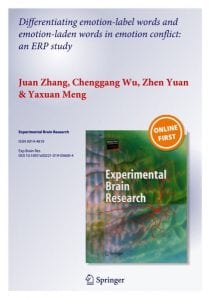The group of Prof. Juan Zhang and their collaborator Prof. Zhen Yuan from the Centre for Cognitive and Brain Sciences, have made significant advance in discovery associated with language and brain cognition. Their recent work “Differentiating emotion-label words and emotion-laden words in emotion conflict: an ERP study” was published and highlighted in Experimental Brain Research.
Despite recent increased attention to emotion conflict, little is known about whether emotion-label words (e.g. sadness, happiness) and emotion-laden words (e.g. death, birthday) function similarly in emotion conflict (i.e. a conflict between the target and distractor in emotion involvement), because the majority of the previous studies implicitly mixed the two. The present study aimed to compare emotion-label words and emotion-laden words in emotion conflict using a flanker task. Specifically, participants (N = 21) were asked to judge the valence of the target words that were vertically surrounded by the words with same (congruent) or different (incongruent) valence as being negative or positive. The behavioral results suggested that negative emotion-laden words were processed faster and more accurately than negative emotion-label words. ERP data further showed that negative emotion-label words elicited larger N200 than negative emotion-laden words on the left hemisphere, while such a difference was identified for positive words on the right hemisphere. Moreover, emotion-laden words elicited smaller N200 in the incongruent condition than that in the congruent condition, whereas no such a distinction was discovered for emotion-label words. The findings demonstrated different cognitive and neural correlates of emotion-label words and emotion-laden words in emotion conflict. In addition, the present study also provides a further theoretical account for differentiating emotion-label words and emotion-laden words with density hypothesis that claims negative emotions are discrete while positive emotions are clustered. Emotions are constructed with language through a combination of emotion-label words and emotion-laden words in a discrete emotion configuration.
Founded in 1966, the Experimental Brain Research publishes original contributions on many aspects of experimental research of the central and peripheral nervous system. The focus is on molecular, physiology, behavior, neurochemistry, developmental, cellular and molecular neurobiology, and experimental pathology relevant to general problems of cerebral function.
Language and brain cognition is one of the core research topics of CCBS. Macao is a multicultural and multilingual area, which offers excellent brain research resources in language, translations and cognitive linguistics involved the Cantonese, Mandarin, Portuguese and English. The platform in CCBS can help reveal the brain cognition mechanism associated with multilingualism and multilingual translation.



